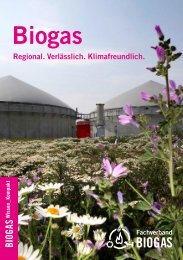Biogas Safety first!
You also want an ePaper? Increase the reach of your titles
YUMPU automatically turns print PDFs into web optimized ePapers that Google loves.
Recommendations for safe plant operation
As biogas is covered by very different areas
of law (agriculture, waste management,
energy industry, health and safety
at work etc.) and is a relatively young
technology, in many countries there are
no biogas-specific competencies or laws, ordinances
or regulations. The same is true in particular for the
field of international standardisation. Initial efforts
are being made to develop an internationally coordinated
set of rules and standards on biogas (ISO TC
255 ‘Standardisation in the field of biogas’).
Established and recognised industry associations
have a crucial role to play in agreeing, developing,
introducing and implementing safety-specific
standards. The interests and needs of the stakeholder
groups in the biogas industry can thus be
pooled to best effect and the maximum degree of
acceptance established. The German Biogas Association,
for example, has conducted debates on the
subject of safety within its own working group on
safety ever since the foundation of the association,
and has issued recommendations accordingly. The
working group is made up of experts working in an
honorary capacity from various safety-related fields
of the biogas industry. The working group supports
the German Biogas Association and its members in
dealing with questions and problems.
illustration: : iStock_Frank Ramspott
operated safely these days. In other countries this is
not the case; all too often, the principle tends to be
‘life is cheap’. The people responsible are not consistently
held to account. These differences in safety
culture are a crucial factor in the safe operation of
plants. Efforts to establish and implement regulations
on safe biogas operation should be pursued as
rigorously as possible in all countries.
One highly significant element of the legal framework
that is meant to guarantee safe biogas operation
is the issue of responsibility. In many countries
when accidents occur there is a very thorough investigation
of what caused the accident and who is
responsible for it. If the accident is serious, the police,
expert appraisers, the fire brigade, employers’
liability insurance association or other institutions
are usually involved in the investigation. The question
of who is financially liable for the damage is
also relevant to insurance companies. If rules and
regulations have been ignored, those responsible
may be subject to severe penalties (financial or even
imprisonment).
Unfortunately, in many countries the matter of responsibility
is not defined, or the rules and regulations
are not consistently applied. One quite crucial
recommendation is therefore that in every country
where industrial biogas plants are operated it is essential
to define who is responsible in the event of an
accident. These rules must be rigorously enforced.
It is usually the case that the operator of biogas
plants bears a high degree of responsibility. He is
responsible for safe operation of the plant and is
generally personally liable. If construction work has
been executed poorly, approval has been granted inadmissibly
or other rules and regulations have been
breached, other companies or institutions may also
be responsible.
In the international context there are very different
ways of dealing with the consequences of accidents.
In some countries every accident, however minor, is
registered and taken seriously, and the causes are
retraced in order to avoid accidents in future if at all
possible. In these countries biogas plants are mostly
58


















